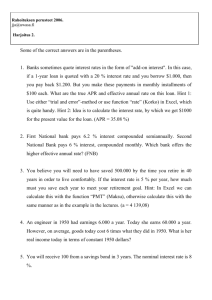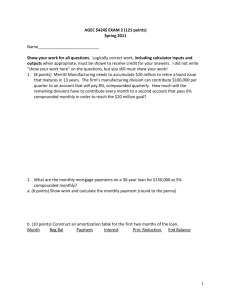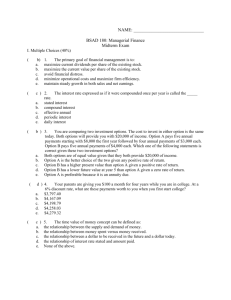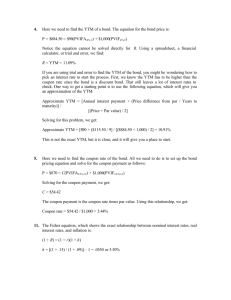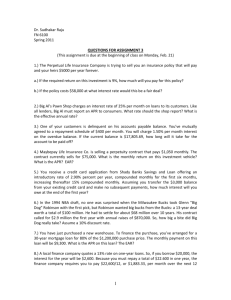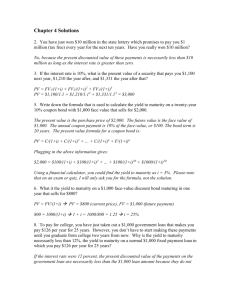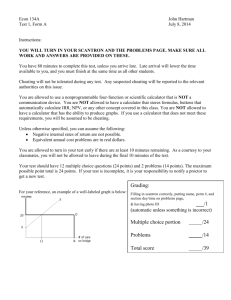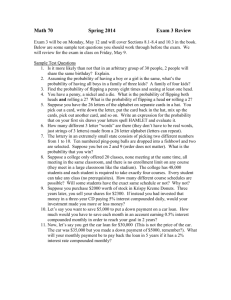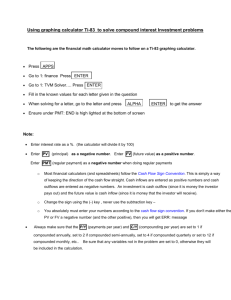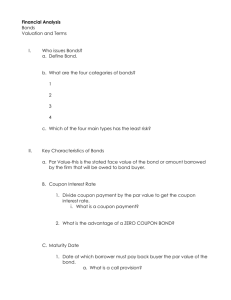Review problems for exam 2: ch4,ch5,ch6
advertisement
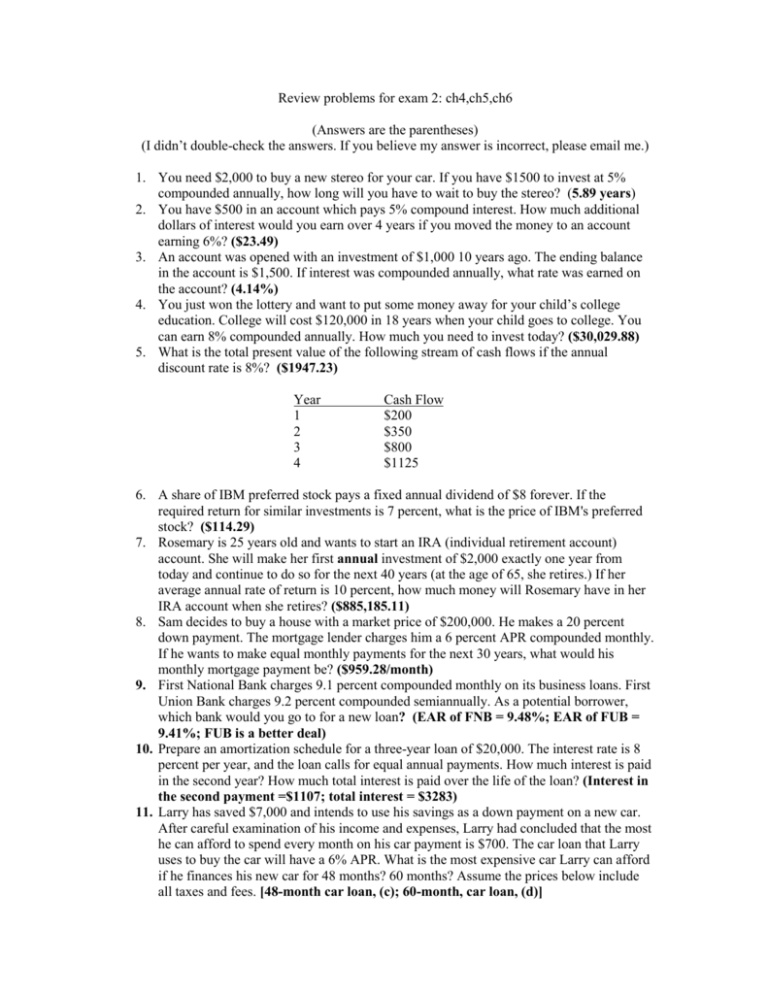
Review problems for exam 2: ch4,ch5,ch6 (Answers are the parentheses) (I didn’t double-check the answers. If you believe my answer is incorrect, please email me.) 1. You need $2,000 to buy a new stereo for your car. If you have $1500 to invest at 5% compounded annually, how long will you have to wait to buy the stereo? (5.89 years) 2. You have $500 in an account which pays 5% compound interest. How much additional dollars of interest would you earn over 4 years if you moved the money to an account earning 6%? ($23.49) 3. An account was opened with an investment of $1,000 10 years ago. The ending balance in the account is $1,500. If interest was compounded annually, what rate was earned on the account? (4.14%) 4. You just won the lottery and want to put some money away for your child’s college education. College will cost $120,000 in 18 years when your child goes to college. You can earn 8% compounded annually. How much you need to invest today? ($30,029.88) 5. What is the total present value of the following stream of cash flows if the annual discount rate is 8%? ($1947.23) Year 1 2 3 4 Cash Flow $200 $350 $800 $1125 6. A share of IBM preferred stock pays a fixed annual dividend of $8 forever. If the required return for similar investments is 7 percent, what is the price of IBM's preferred stock? ($114.29) 7. Rosemary is 25 years old and wants to start an IRA (individual retirement account) account. She will make her first annual investment of $2,000 exactly one year from today and continue to do so for the next 40 years (at the age of 65, she retires.) If her average annual rate of return is 10 percent, how much money will Rosemary have in her IRA account when she retires? ($885,185.11) 8. Sam decides to buy a house with a market price of $200,000. He makes a 20 percent down payment. The mortgage lender charges him a 6 percent APR compounded monthly. If he wants to make equal monthly payments for the next 30 years, what would his monthly mortgage payment be? ($959.28/month) 9. First National Bank charges 9.1 percent compounded monthly on its business loans. First Union Bank charges 9.2 percent compounded semiannually. As a potential borrower, which bank would you go to for a new loan? (EAR of FNB = 9.48%; EAR of FUB = 9.41%; FUB is a better deal) 10. Prepare an amortization schedule for a three-year loan of $20,000. The interest rate is 8 percent per year, and the loan calls for equal annual payments. How much interest is paid in the second year? How much total interest is paid over the life of the loan? (Interest in the second payment =$1107; total interest = $3283) 11. Larry has saved $7,000 and intends to use his savings as a down payment on a new car. After careful examination of his income and expenses, Larry had concluded that the most he can afford to spend every month on his car payment is $700. The car loan that Larry uses to buy the car will have a 6% APR. What is the most expensive car Larry can afford if he finances his new car for 48 months? 60 months? Assume the prices below include all taxes and fees. [48-month car loan, (c); 60-month, car loan, (d)] a. A new Honda Accord Ex with a price of $26,400 b. A new Acura 3.2TL with a price of $35,330 c. A new BMW 330xi with a price of $36,550 d. A new Lexus GS430 with a price of $43,000 e. A new BMW M5 Sports Sedan with a price of $71,095 12. A rookie quarterback is in the process of negotiating his first contract. The team’s general manager has offered him three possible contracts. Each of the contacts lasts for 4 years. Signing bonus varies and is paid at the beginning of the contract. All of the salary money is guaranteed and is paid at the end of each year. The terms of the contracts are listed bellows: Contract I Contract II Contract III Signing bonus $5 million $3 million $0 Salary Year 1 3 million 2 million 3 million Year 2 3 million 3 million 4 million Year 3 3 million 4 million 5 million Year 4 3 million 5 million 6 million If the annual discount rate is 8 percent, which contact offers him the most value? [NPV(I) = $14.94 million; NPV(II) = $14.27 million; NPV(III) = $14.58 million. Contract I provides the most value] 13. Last year, you earned a rate of return of 7.86 percent on your bond investments. During that time, the inflation rate was 2.15 percent. What was your exact real rate of return? a. 5.29 percent b. 5.59 percent c. 5.71 percent d. 7.74 percent e. 10.01 percent 14. If your nominal rate of return is 10.45 percent and your real rate of return is 6.38 percent, what is the approximate inflation rate? a. 3.42 percent b. 3.83 percent c. 3.91 percent d. 4.07 percent e. 4.21 percent 15. The bonds of IBM carry a 10% coupon rate, make annual coupon payments, have a $1,000 par value, and mature in 4 years. The YTM is 7%. What should the bond price be? ($1101.62) 16. Cornerstone Industries has a bond outstanding that has a 7% coupon rate and a market price of $887.76. If the bond matures in 5 years and makes semi-annual coupon payments, what is the yield to maturity (YTM) on the bond? (YTM = 9.90%) 17. AT&T bonds are 5 percent coupon bonds, have 15 years to maturity, and make semiannual coupon payments. Assume the YTM is 8 percent. If interest rates suddenly rise by 2 percent, what is the percentage change in AT&T bond price? (B1 = $740.62; B2 = $615.69; % = (B2 – B1) / B1 = -16.87%)

